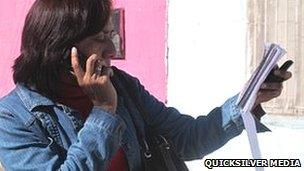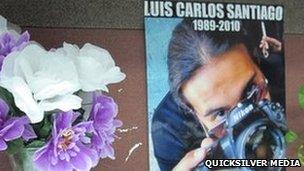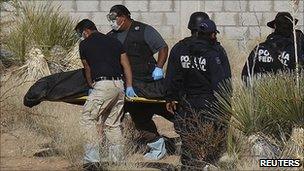Mexican reporter Luz Sosa's dangerous job in Juarez
- Published

Luz Sosa and her colleagues have reported on hundreds of murders
It was, by her own admission, one of the most difficult stories that Mexican crime reporter Luz Sosa has ever had to cover: the murder in November 2008 of her own boss and friend Armando Rodriguez.
He was shot outside his house in Ciudad Juarez, the Mexican city close to the US border that has become synonymous with the country's vicious drug war.
Mr Rodriguez, chief crime reporter at the city's main newspaper, El Diario, was setting off for school with his young children when a lone gunman approached and shot him dead with a 9mm pistol.
"I was just leaving home myself when my editor called me and said: Armando's been killed… be careful, come straight here to the office," 41-year-old Luz says.
First making sure her own two children were safely back home, she headed across town to the newspaper's offices.
"I couldn't believe it. No, not Armando, I kept repeating to myself. It was such a shock. I just cried and cried. And then I had to write up an article about it all," she added, her voice dipping as she spoke.
Real risks
Luz has one of the most dangerous jobs in one of the most violent cities in the world.
Her daily beat takes her from one gruesome scene to another in a city that witnessed some 3,000 killings last year.
Most are believed to be the result of a vicious struggle between drug cartels battling for control over the lucrative drug smuggling routes into the US.
"On one of my worse days I recently had to cover 20 murders in one 12-hour shift," she said.
Almost all the victims died from gunshots, killed in public places.
Trying to collect information about each murder, or investigate what or who lies behind the city's violence has brought journalists like Luz and her colleagues at El Diario, into direct confrontation with the drug gangs.
In September last year, another El Diario employee, 21-year-old trainee photographer Luis Carlos Santiago, was shot dead in broad daylight.

Luis Carlos Santiago's murder led to an impassioned editorial in El Diario
For most of our hour-long conversation, which took place in London this month when Luz was visiting the UK to promote a a television documentary for Channel Four about her work, , external she spoke defiantly, but modestly, about the dangers she faced on a daily basis.
"We live in a vicious circle of permanent intimidation, trying to force journalists into silence," she said.
The culprits, she said, were not just the cartels and rogue police officers who work for them, but the state institutions which cannot provide protection or guarantees for the media.
Yet Luz said the murder of her two colleagues had made her "more determined" not to be coerced.
"Once I'm afraid, it would be better to resign and do something else," she said.
Gruesome warning
By way of example - and as if I were about to doubt her sincerity - she then recounted one particularly incident, shocking even by Juarez's horrendous standards, which took place on the same day Mr Santiago was buried.
"We are at the funeral and someone sent word that a decapitated head had been left on the top of car nearby," Luz began telling me.
When she and some of her fellow mourners got there, they found a copy of El Diario on car's windscreen beside the severed head, open at an article Luz had written about Luis Carlos's murder.

Mexican officials say Juarez's murder rate has fallen from an average 11 a day to four
Did this make her afraid for her life? I asked the question almost apologetically.
"No," she replied, "it could have been for me, or for anyone else at the paper."
El Diario's owners certainly took it seriously enough, taking the unprecedented step of using the front-page headline in the following day's edition to address those responsible
"What do you want from us?" it read.
There have not been any further attacks on El Diario journalists since, Luz said. But after the incident, the paper's editors decided to remove Luz's by-line from most of her articles.
Before we part, I have two more questions for Luz.
How she does she feel being so far away from the daily drama of her life and work on the streets of Juarez? Does it feel like a totally different world?
She paused before answering, as if thinking of the right words to express herself.
"I can't forget what's happening back home, I am constantly looking on the internet for the news," she said.
"But being here I realise just what we are facing back there. And it makes me angry. I have a responsibility to keep going, to report on these things and to keep asking why has our peace and tranquillity been stolen from us?"
- Published21 September 2010